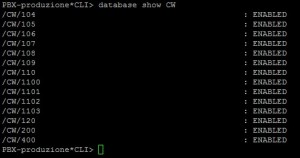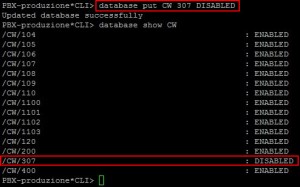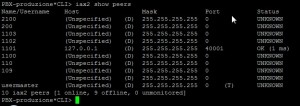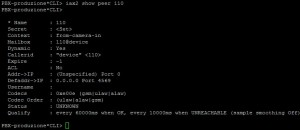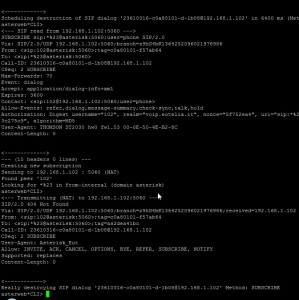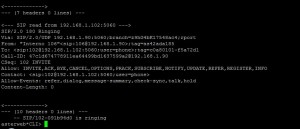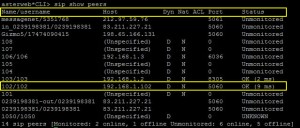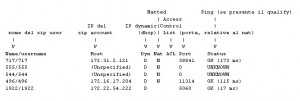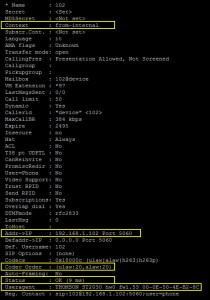Asterisk 1.6.2.15 Now Available
Il giorno 8 dicembre, il Team di Sviluppo di Asterisk ha annunciato il rilascio della beta Asterisk 1.6.2.15.
Dal post originale:
he release of Asterisk 1.6.2.15 resolves several issues reported by the
community and would have not been possible without your participation.
Thank you!
The following is a sample of the issues resolved in this release:
* When using chan_skinny, don't crash when parking a non-bridged call.
(Closes issue #17680. Reported, tested by jmhunter. Patched, tested by DEA)
* Add ability for Asterisk to try both the encoded and unencoded subscription
URI for a match in hints.
(Closes issue #17785. Reported, tested by ramonpeek. Patched by tilghman)
* Set the caller id on CDRs when it is set on the parent channel.
(Closes issue #17569. Reported, patched by tbelder)
* Ensure user portion of SIP URI matches dialplan when using encoded characters
(Closes issue #17892. Reported by wdoekes. Patched by jpeeler)
* Resolve issue where Party A in an analog 3-way call would continue to hear
ringback after party C answers.
(Patched by rmudgett)
* Fix problem with qualify option packets for realtime peers never stopping.
The option packets not only never stopped, but if a realtime peer was not in
the peer list multiple options dialogs could accumulate over time.
(Closes issue #16382. Reported by lftsy. Tested by zerohalo. Patched by
jpeeler)
* Multiple fixes related to Local channels.
For a full list of changes in this release, please see the ChangeLog:
http://downloads.asterisk.org/pub/telephony/asterisk/ChangeLog-1.6.2.15
Asterisk 1.8.1-rc1 Now Available
Il giorno 23 novembre, il Team di Sviluppo di Asterisk ha annunciato il rilascio della beta Asterisk 1.8.1-rc1.
The release of Asterisk 1.8.1-rc1 resolves several issues reported by the
community and would have not been possible without your participation.
Thank you!
The following is a sample of the issues resolved in this release:
* Fix issue when using directmedia. Asterisk needs to limit the codecs offered
to just the ones that both sides recognize, otherwise they may end up sending
audio that the other side doesn't understand.
(Closes issue #17403. Reported, patched by one47. Tested by one47, falves11)
* Resolve issue where Party A in an analog 3-way call would continue to hear
ringback after party C answers.
(Patched by rmudgett)
* Fix playback failure when using IAX with the timerfd module.
(Closes issue #18110. Reported, tested by tpanton. Patched by jpeeler)
* Fix problem with qualify option packets for realtime peers never stopping.
The option packets not only never stopped, but if a realtime peer was not in
the peer list multiple options dialogs could accumulate over time.
(Closes issue #16382. Reported by lftsy. Tested by zerohalo. Patched by
jpeeler)
* Fix issue where it is possible to crash Asterisk by feeding the curl engine
invalid data.
(Closes issue #18161. Reported by wdoekes. Patched by tilghman)
For a full list of changes in this release candidate, please see the ChangeLog:
http://downloads.asterisk.org/pub/telephony/asterisk/ChangeLog-1.8.1-rc1
Thank you for your continued support of Asterisk!
Asterisk 1.6.2.15-rc1 Now Available
Il giorno 23 novembre, il Team di Sviluppo di Asterisk ha annunciato il rilascio della beta Asterisk 1.6.2.15-rc1.
Dal post originale:
The release of Asterisk 1.6.2.15-rc1 resolves several issues reported by the
community and would have not been possible without your participation.
Thank you!
The following is a sample of the issues resolved in this release:
* When using chan_skinny, don't crash when parking a non-bridged call.
(Closes issue #17680. Reported, tested by jmhunter. Patched, tested by DEA)
* Add ability for Asterisk to try both the encoded and unencoded subscription
URI for a match in hints.
(Closes issue #17785. Reported, tested by ramonpeek. Patched by tilghman)
* Set the caller id on CDRs when it is set on the parent channel.
(Closes issue #17569. Reported, patched by tbelder)
* Ensure user portion of SIP URI matches dialplan when using encoded characters
(Closes issue #17892. Reported by wdoekes. Patched by jpeeler)
* Resolve issue where Party A in an analog 3-way call would continue to hear
ringback after party C answers.
(Patched by rmudgett)
* Fix problem with qualify option packets for realtime peers never stopping.
The option packets not only never stopped, but if a realtime peer was not in
the peer list multiple options dialogs could accumulate over time.
(Closes issue #16382. Reported by lftsy. Tested by zerohalo. Patched by
jpeeler)
* Multiple fixes related to Local channels.
For a full list of changes in this release candidate, please see the ChangeLog:
http://downloads.asterisk.org/pub/telephony/asterisk/ChangeLog-1.6.2.15-rc1
Thank you for your continued support of Asterisk!
Asterisk 1.8.0 Release Candidate 3 Now Available
Il Team di Sviluppo di Asterisk ha annunciato il rilascio della terza beta della 1.8.0.
Dal post originale:
This release candidate contains fixes since the release candidate as reported by
the community. A sampling of the changes in this release candidate include:
* Still build chan_sip even if res_crypto cannot be built (use, but not depend)
(Reported by a user on the mailing list. Patched by tilghman)
* Get notifications for call files only when a file is closed, not when created
(Closes issue #17924. Reported by mkeuter. Patched by abeldeck)
* Fixes to chan_gtalk to allow outbound DTMF support to work correctly. Gtalk
expects the DTMF to arrive on the RTP stream and not via jingle DTMF
signalling.
(Patched by dvossel. Tested by malcolmd)
* Fixes to allow chan_gtalk to communicate with the Gmail web client.
(Patched by phsultan and dvossel)
* Fix to GET DATA to allow audio to be streamed via an AGI.
(Closes issue #18001. Reported by jamicque. Patched by tilghman)
* Resolve dnsmgr memory corruption in chan_iax2.
(Closes issue #17902. Reported by afried. Patched by russell, dvossel)
A short list of available features includes:
* Secure RTP
* IPv6 Support in the SIP channel driver
* Connected Party Identification Support
* Calendaring Integration
* A new call logging system, Channel Event Logging (CEL)
* Distributed Device State using Jabber/XMPP PubSub
* Call Completion Supplementary Services support
* Advice of Charge support
* Much, much more!
A full list of new features can be found in the CHANGES file.
http://svn.digium.com/view/asterisk/branches/1.8/CHANGES?view=checkout
For a full list of changes in the current release candidate, please see the
ChangeLog:
http://downloads.asterisk.org/pub/telephony/asterisk/ChangeLog-1.8.0-rc3
Distribuzioni Asterisk: Trixbox, Elastix e PBXInaFlash. Quali differenze ?
Iniziamo subito ad analizzare le 3 distribuzioni di cui sopra:
- tutte e 3 utilizzano LAMP (Linux, Apache, MySql e PHP)
- Linux: il Sistema Operativo e in specifico centOS 5
- Apache: il Web Server e in specifico Apache 2
- MySql: come gestore di DB e in specifico MySql 5
- Php: come linguaggio interpetrato di programmazione Web e in specifico Php5
D: Ma allora: quali sono le differenze ?
R: Per la parte PBX nessuna ! Sono proprio identici !
Le differenze sono negli strumenti che mettono a disposizione per la configurazione del sistema (inteso proprio come "macchina" e non come PBX) e per la gestione dei programmi/pacchetti con l'utilizzo di propri repository.
Ecco qui una sintetica tabella comparativa:
| Servizio/Funzione da Web GUI | Trixbox | Elastix | PBXInaFlash |
| Configurazione rete | Si | Si | No |
| Gestione pacchetti | Si | Si | No |
| Configurazione smtp | Si | Si | No |
| Gestione Server di posta | No | Si | No |
| Gestione Webmail | No | Si Round Cube |
No |
| Hylafax/Iaxmodem | No | Si | No |
| Gestione Sistema (Webmin) | No | No | Si |
Asterisk CLI – comandi su database interno
Vediamo oggi il "Database Interno" di Asterisk, che si base su DB Berkeley.
La struttura prevede il raggruppamento dei dati in "famiglie" e l'associazione delle stesse a chiavi univoche.
Alcuni dei comandi per gestire il DB, sono:
- database show
- database put
- database del
Vediamoli in dettaglio:
PBX-shell*CLI> database show
Visualizza tutti i record del DB.
PBX-shell*CLI> database show [family]
Visualizza tutti i record del DB che appartengono a quella famiglia. Es. database show CW
PBX-shell*CLI> database put [family] [key] [valore]
Il comando consente di inserire un record nel DB. Es. database put CW 307 DISABLED
PBX-shell*CLI> database del [family] [key]
Il comando consente di eliminare uno o più record che soddisfano la condizione. Es. database del CW 307
Asterisk CLI – iax2 show …
In questo How To, vedremo alcuni dei comandi relativi allo IAX2":- iax2 show peers
- iax2 show peer
- iax2 show registry
Vediamoli in dettaglio:
PBX-shell*CLI> iax2 show peers
Elenca gli accounts IAX2 (interni, fasci, ...) configurati in Asterisk con alcune interessanti informazioni come, ad esempio, l'IP corrispondente all'account, la porta utilizzata, lo Status.
PBX-shell*CLI> iax2 show peer 110
Visualizza i dettagli relativi all'account IAX2. Ovviamente molti dei dati presenti si andranno ad "analizzare" quando necessario, ma in ogni caso si possono rilevare informazioni "prezione", come:
- il contesto assegnato (from-camera-in, ...)
- i codecs, con la relativa sequenza (molto importante), utilizzati
- ...
PBX-shell*CLI> iax2 show registry
Elenca i fasci iax2 che hanno "stringa di registrazione", come ad esempio i fasci relativi alle linee VoIP.
Asterisk CLI – sip set debug …
Proseguiamo col vedere altri comandi relativi al "SIP", affacciandoci nel mondo dei "debug":- sip set debug
- sip set debug ip
- sip set debug peer
- sip set debug off
Vediamoli in dettaglio:
PBX-shell*CLI> sip set debug
Abilita il debug su tutto il traffico SIP.
PBX-shell*CLI> sip set debug ip 192.168.1.102
Abilita il debug sul traffico SIP di uno specifico indirizzo IP (telefono o apparato SIP in genere).
PBX-shell*CLI> sip set debug peer 102
Abilita il debug sul traffico SIP di uno specifico account (telefono o apparato SIP in genere).
NOTA: Per meglio comprendere la differenza tra sip set debug ip e sip set debug peer facciamo un esempio pratico: se abbiamo un Media Gateway con IP 192.168.1.250 con configurati 4 accounts SIP (9001, 9002, 9003, 9004) andremo a settare il sip set debug ip 192.168.1.250 se vorremo avere il debug di tutto il traffico SIP del Media Gateway; setteremo il sip set debug peer 9002 se vorremo, invece, avere solo il debug dell'account 9002 appartenente sempre allo stesso Media Gateway.
PBX-shell*CLI> sip set debug off
Disabilita il debug sul traffico SIP.
Asterisk CLI – sip show …
In questo How To, vedremo alcuni dei comandi relativi al "SIP":- sip show peers
- sip show peer
- sip show registry
Vediamoli in dettaglio:
PBX-shell*CLI> sip show peers
Elenca gli accounts SIP (interni, fasci, ...) configurati in Asterisk con alcune interessanti informazioni come, ad esempio, l'IP corrispondente all'account, NAT, la porta utilizzata, lo Status (i dati relativi al ping, si hanno solo se è presente "qualify=yes").
PBX-shell*CLI> sip show peer 102
Visualizza i dettagli relativi all'account SIP. Ovviamente molti dei dati presenti si andranno ad "analizzare" quando necessario, ma in ogni caso si possono rilevare informazioni "prezione", come:
- il contesto assegnato (from-internal, ...)
- i codecs, con la relativa sequenza (molto importante), utilizzati
- il tipo di apparato hardware (se esiste) corrispondente con i dettagli (firmware)
- ...
PBX-shell*CLI> sip show registry
Elenca i fasci sip che hanno "stringa di registrazione", come ad esempio i fasci relativi alle linee VoIP.
Asterisk CLI – Inofrmazioni Generali e funzionamento
PREMESSAConoscere e sapere utilizzare la CLI di Asterisk (almeno per le cose essenziali) è estremamente importante, poichè proprio dalla CLI si può interagire con Asterisk.
Abbiamo deciso di iniziare questo programma denominato "Asterisk in pillole" proprio da questo argomento perchè ci siamo resi conto che moltissimi utenti, soprattutto tra coloro che utilizzano FreePBX, conoscono poco o talvolta sconoscono del tutto questo strumento che, senza alcun dubbio, è fondamentale per la gestione di un PBX Asterisk.
Finite le "pillole" relative alla CLI, passeremo alla "Programmazione Asterisk".
GENERALE
La CLI (Command Line Interface) di Asterisk è, come dice lo stesso "nome", una interfaccia da riga di comando, eseguibile dalla Shell di Linux.
Dalla CLI è possibile:
- visualizzare l'attività di Asterisk
- eseguire comandi
ESECUZIONE
Per eseguirla:
[PBX-shell ~]# asterisk -r
Esistono altre opzioni utilizzabili per la CLI. Vi rimandiamo qui: www.voip-info.org/wiki/view/Asterisk+options
VERBOSITÀ
È possibile aggiungere alcune v prima o dopo la r per modificare il livello di dettaglio (verbosità) della visualizzazione a video (più v si aggiungono, maggiore sarà il dettaglio):
[PBX-shell ~]# asterisk -vvvvvvr
Ad ogni esecuzione della CLI, viene visualizzato il prededente e l'attuale livello di verbosità.
Facciamo alcuni esempi per meglio comprendere le differenze di comportamento della CLI:
[PBX-shell ~]# asterisk -rvvvvv
In questo esempio, la precedente verbosità era 0 mentre l'attuale è 4, per effetto delle 4 v nel comando.
La volta successiva che si rientrerà nella CLI, ad esempio con:
[PBX-shell ~]# asterisk -rvvvvvvvvvvv
avremo:
Asterisk rilasciate: 1.4.28, 1.6.0.20, 1.6.1.12 e 1.6.2.0

Il 18/12 il Team di Sviluppo di asterisk ha rilascito le versioni 1.4.28, 1.6.0.20, 1.6.1.12 e 1.6.2.0 scaricabili da http://downloads.asterisk.org/pub/telephony/asterisk/.
Questi i post oriniginali:
Asterisk 1.4.28-rc1, 1.6.0.20-rc1, 1.6.1.12-rc1, and 1.6.2.0-rc8 released

Il team di sviluppo di Asterisk ha rilasciato le nuove versioni canditade di Asterisk: 1.4.28, 1.6.0.20, 1.6.1.12 e 1.6.2.0.
Per il download: http://downloads.asterisk.org/pub/telephony/asterisk/
Questi i ChangeLogs:
http://downloads.asterisk.org/pub/telephony/asterisk/ChangeLog-1.4.28-rc1
http://downloads.asterisk.org/pub/telephony/asterisk/ChangeLog-1.6.0.20-rc1
http://downloads.asterisk.org/pub/telephony/asterisk/ChangeLog-1.6.1.12-rc1
http://downloads.asterisk.org/pub/telephony/asterisk/ChangeLog-1.6.2.0-rc8
Questo il link del post originale: http://www.asterisk.org/node/49876
RTP Remote Crash Vulnerability
"An attacker sending a valid RTP comfort noise payload containing a data length of 24 bytes or greater can remotely crash Asterisk."
Questo il documento dove trovate i dettagli: http://downloads.asterisk.org/pub/security/AST-2009-010.pdf
La vulnerabilità è stata eliminata nelle seguenti versioni di Asterisk:
- 1.2.37
- 1.4.27.1
- 1.6.0.19
- 1.6.1.11
Per cui non perdete tempo. Fate gli aggiornamenti !!!
Elastix 1.6 ready!
Wednesday, 04 November 2009Elastix ha annunciato il rilascio della stabile 1.6 di Elastix (1.6 da non confordere con la "release" di Asterisk; è la "numerazione" di Elastix).
Questa relase è equipaggiata con:
- Asterisk 1.4.26.1-4
- Dahdi 2.2.0.2-6
- Kernel 2.6.18.164.el5, the latest CentOS 5.3 kernel
Questo il ChangeLogs: http://www.elastix.org/changelog.txt
Asterisk 1.4.27-rc5, 1.6.0.18-rc3, 1.6.1.10-rc3, and 1.6.2.0-rc6 released
Il team di sviluppo di Asterisk ha rilasciato le nuove versioni canditade di Asterisk: 1.4.27, 1.6.0.18, 1.6.1.10, and 1.6.2.0.
Per il download: http://downloads.asterisk.org/pub/telephony/asterisk/
Questi i ChangeLogs:
http://downloads.asterisk.org/pub/telephony/asterisk/ChangeLog-1.4.27-rc5
http://downloads.asterisk.org/pub/telephony/asterisk/ChangeLog-1.6.0.18-rc3
http://downloads.asterisk.org/pub/telephony/asterisk/ChangeLog-1.6.1.10-rc3
http://downloads.asterisk.org/pub/telephony/asterisk/ChangeLog-1.6.2.0-rc6
Questo il link del post originale: http://www.asterisk.org/node/49867


